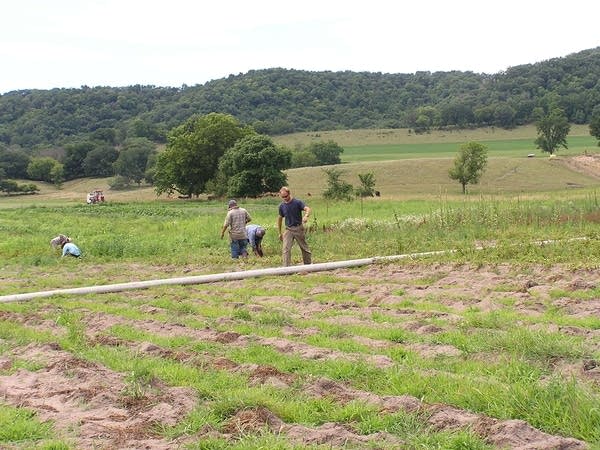Minnesota organization begins first local 'fair trade' label

Featherstone Farms grows organic vegetables in a sea of Minnesota corn and soybeans. The owner, Jack Hedin, plants everything from tomatoes and broccoli to green beans and cantaloupe. Everything on Hedin's farm is small.
He operates on 100 acres, with just 18 full-time workers. And he pays those workers between $7 and $10, well above what most farm workers make.

He sells to all of the co-ops in the Twin Cities. He also sells his cabbage to Whole Foods stores in Chicago, which is a good market -- for the moment.
"I sort of live in fear of it," he says. "Going to some meeting some spring with Whole Foods and them saying, 'Sorry, one of these conventional vegetable farms in southern Illinois with 4,000 acres has decided to put 10 percent of their crop into organics. They're going to try it this year, and that means we're not going to buy any cabbage from you.'"
Create a More Connected Minnesota
MPR News is your trusted resource for the news you need. With your support, MPR News brings accessible, courageous journalism and authentic conversation to everyone - free of paywalls and barriers. Your gift makes a difference.
"It could happen," Hedin says.
Those conventional farmers could easily undercut Hedin's prices. If he loses that market, his margins are so thin, he could lose his farm.
But the way Hedin manages his farm is considered an asset by some. Hedin's farm is one of four that are now certified and labeled "fair trade," starting this week.
Socially conscious food has a long history in Minnesota. Co-ops sold locally grown and organic produce 40 years ago.

Today, Wal-Mart and Super Target have organic produce sections. Eric Esse of the Local Fair Trade Network says the spread of organic is great. But he says there's a difference between big-box retailer organic and co-op organic. The difference, he says, is in local producers and their fair labor practices.
"What's really at stake is our local family farmers, and whether they can continue and whether we can have more of them," Esse says. "There's already more people figuring out the value of local farms and family farms, but that doesn't change the fact that most family farms are touch-and-go financially."
Esse's organization believes the way to support the farmers and their products is to add a "fair trade" label. The label justifies a higher price, and Esse bets it will also translate into additional sales for farmers like Jack Hedin.
In Minneapolis, Seward Co-op general manager Sean Doyle is willing to make that bet, too. Seward and Bluff Country Co-op in Winona will be the only two co-ops to carry the label this year. Doyle says the fair trade label is as much about marketing as it is about ethics.
"It has a great advantage to the co-op, because it helps us really cement our reputation in the community," Doyle says. "We've been, from day one 35 years ago, about supporting local agriculture. We provide consumers with a product they can trust. This kind of label can really help us clearly identify ourselves in the marketplace."

Doyle says his customers want all the information they can get about the food they buy.
Minnesota Public Radio Chief Economics Correspondent Chris Farrell says this may sound like a gimmick, but he doesn't think it is.
"I think it's also part of a much larger movement toward trying to express values with your money, and appeal to consumers who want to express values with their money," he says.
Farrell says like organics, these products potentially have a market beyond co-op members, if their prices don't grow too far beyond the chain grocers. He says that's partly due to recent national and international food scares.
"With the problems of imported food, particularly food from China, there is a growing market in certification where the consumer wants to know, 'Well where is this food from?'" he says.
Farrell says the people buying local fair trade labelled products may be the early adapters of the next market development.
The fair trade network says based on the results of the pilot project, next year the group intends to certify as many farms as it can and potentially expand its labeling.
